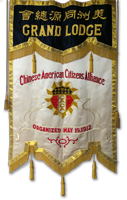In the Beginning
Though that prophesy appeared in the Daily Alta California on May 12, 1852, Chinese immigrants were slow in achieving such expectations. The inevitable economic adjustments in an unsettled new world, as well as old world conservatism contributed to the apparent lack of progress. By the end of the 19th century, the Chinese, who had been brought to this country in great numbers as cheap labor to help build the railroads, later became this country's scapegoats when poor economic conditions and high unemployment became prevalent. Public opinion became openly prejudiced against Chinese, so much so that in denying a Chinese the right to testify in court against a white person, the California Supreme Court stated that the Chinese were "a race of people whom nature has marked as inferior, and who are incapable of progress or intellectual development beyond a certain point;" and to allow them to testify would "admit them to all equal rights of citizenship, and we might as soon see them at the polls, in the jury box, upon the bench, and in our legislative halls. (People v. Hall, (1854)4 Cal. 339, 405)
Formation of New Organization
Against this backdrop, a small group of young Chinese Americans, born and raised in the United States, assembled in San Francisco and decided that they would have to take matters into their own hands if they were going to combat this sentiment and accelerate the process of assimilation. They found that they not only had to fight the hostile public opinion against their Chinese ancestry, but they also had to overcome the skepticism of their own elders who felt that these young upstarts were becoming too Americanized and were forgetting the ideals of the old country. Despite this opposition, this group of Chinese Americans believed in the importance of their American birth and felt that they nevertheless had a role to play in shaping this country. They were not easily discouraged and believed that, in the final analysis, they could be judged on the basis of their own actions and achievements. The Chinese American community needed leaders with their background and their crusading spirit to actively participate in and partake of the advantages of American ideals, traditions, and institutions.
Thus, the fraternal order of the Native Sons of the Golden State came into existence in San Francisco. First incorporated in the State of California by Chun Dick in 1895, the group was later reorganized in 1904 by Walter U. Lum, Joseph K. Lum, and Ng Gunn. By 1912, other Chinese Americans in communities outside of San Francisco learned of the organization and wanted to form local chapters. Oakland, San Francisco, and Los Angeles soon became the nucleus of the Grand Parlor. One year later, units in Fresno and San Diego were added, making it a statewide organization.
New Charter
Membership in the organization was at first confined to Chinese males born within the State of California, but as more and more requests came to establish branches elsewhere, it became apparent that a complete reorganization was necessary. The name,'"Native Sons of the Golden State," no longer adequately described the national organization that was planned, so a new charter was taken out in 1915 under the name, the "Chinese American Citizens Alliance." The Grand Lodge became the highest governing body of the Alliance with its officers elected duing each biennial convention. Local lodges in San Francisco, Oakland, Los Angeles, San Diego, Fresno, Portland, Chicago, Pittsburgh, Detroit, and Boston each had their own board of officers and associates. In addition, each local lodge annually chose a Grand Representative to serve in a Liaison capacity between their own lodge and the Grand Lodge.
By 1920, the building housing the National HeadQuarters at 1044 Stockton Street in San Francisco was completed. The grand opening celebration on August 10th of that year brought into full realization the plans conceived in Los Angeles in 1914, perfected in San Francisco in 1915, and carried out in Oakland in 1917.
In later years, other lodges were opened in San Antonio, Houston, Albuquerque, Tucson, Phoenix, Sunnyvale (now renamed Peninsula Lodge), Washington DC, New York, and Sacramento. From that small group of men in San Francisco, the Alliance became a national organization. In 1977, another milestone in membership was achieved when women were admitted as members for the first time. Since then, a number of women have been elected to hold office in local lodges, including the office of president. By the national convention in Houston in 1993, the numbers of male and female presidents of regional lodges were almost equal. In 1997, at the convention in Phoenix, Nancy Ann Gee was elected as the first woman to hold the office of National Grand President.
Chinese Times
The Chinese Times, founded in 1924, became the official newspaper of the Alliance. It grew to have the largest circulation of all Chinese language newspapers in this country. Unlike other Chinese language newspapers distributed in the United States, it did not have ties to any foreign country or political group, becoming the only Chinese daily newspaper to be owned, edited, and published by American citizens. At its peak, the Chinese Times commanded the respect of those of Chinese descent throughout the world because of its unbiased editorials and authentic news coverage. Later, the Chinese Times became a corporate business entity separate from the Alliance, but many of its shareholders were Alliance members, and Alliance members served on its Board of Directors.
After many years of operation, however, as Chinese Americans became more and more assimilated into American society, fewer and fewer needed to rely on a Chinese language newspaper for information. In fact, after many generations of living in the United States, some Chinese Americans could no longer read the Chinese language. As a result, the Chinese Times readership dwindled to a point where it was no longer economically feasible to continue operations, and in 1988, all of the Alliance's interest in the Chinese Times was sold to independent buyers.
Insurance
Because of discriminatory requirements imposed by insurance companies at the turn of the century, very few Chinese Americans were able to provide any financial protection for their families. In 1920, to further the principles of fraternal brotherhood, a "death benefit fund" was created by the Chinese American Citizens Alliance. Upon the death of a lodge brother, the sum of one thousand dollars, collected through assessment of the surviving members, was paid to the member's widow and family.
By 1947, liberalization of insurance regulations had progressed to such an extent that it was no longer necessary for members to continue to shoulder this financial burden for their fellow members, and this program ceased. In the course of its 27 years of operation, thousands of widows and orphans benefited from this program. To this day, the Alliance still receives an occasional request for this benefit from a family who, after the death of a long-time Alliance member, uncovers a certificate for the benefit amongst the personal effects of the deceased member; over time, of course, the number of such requests have diminished.

